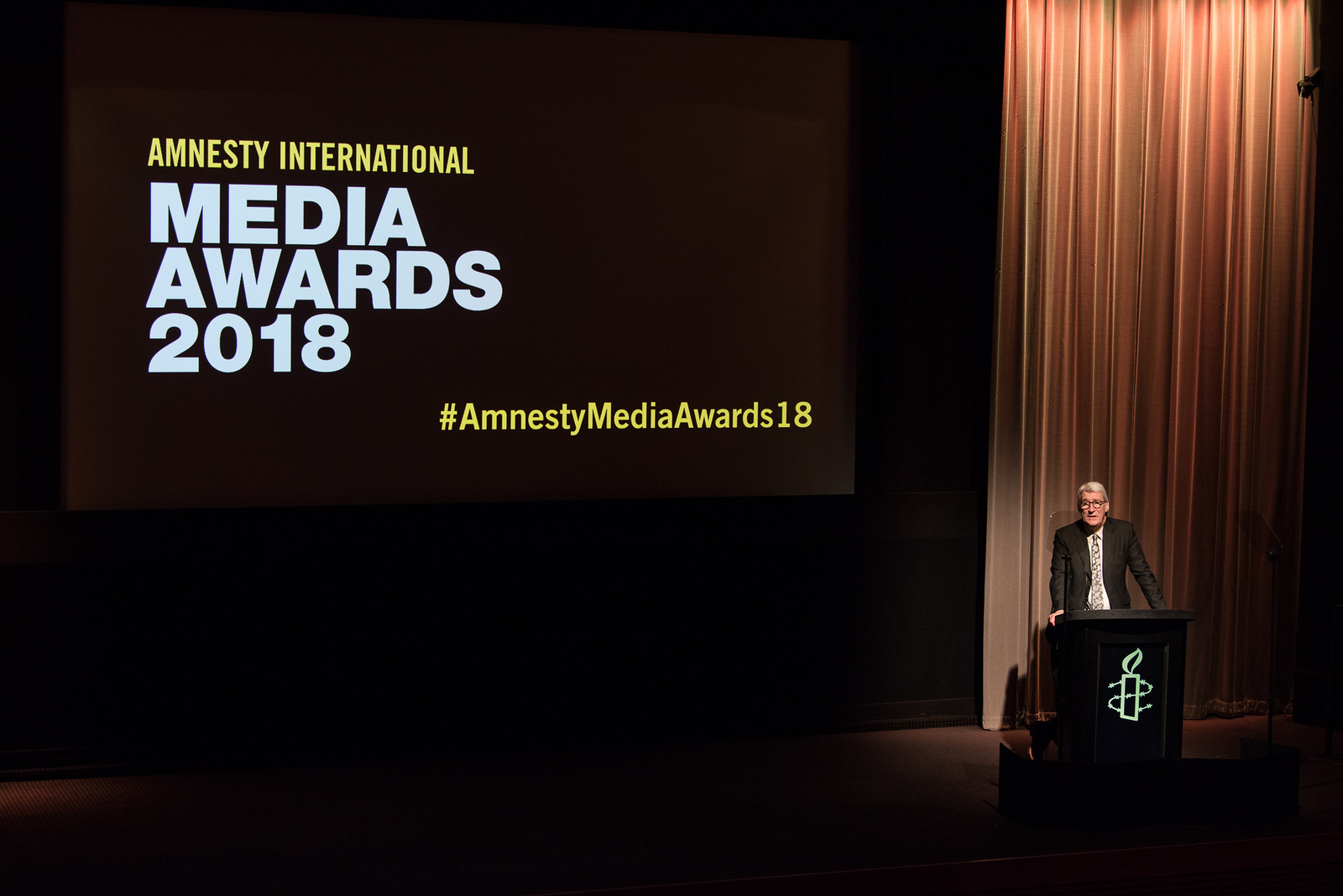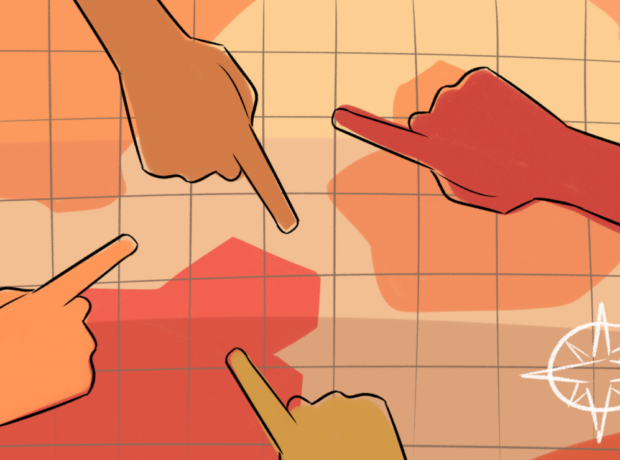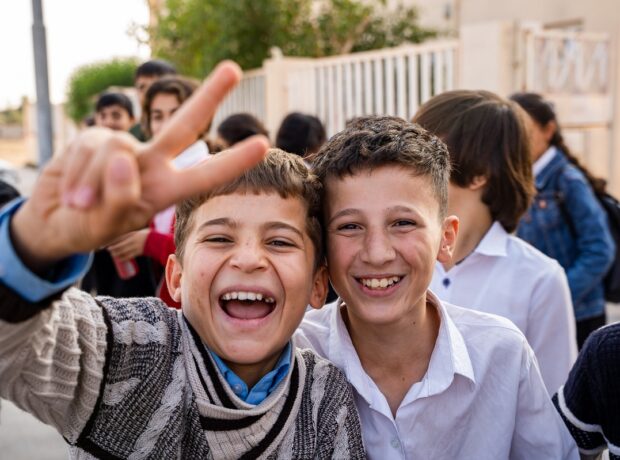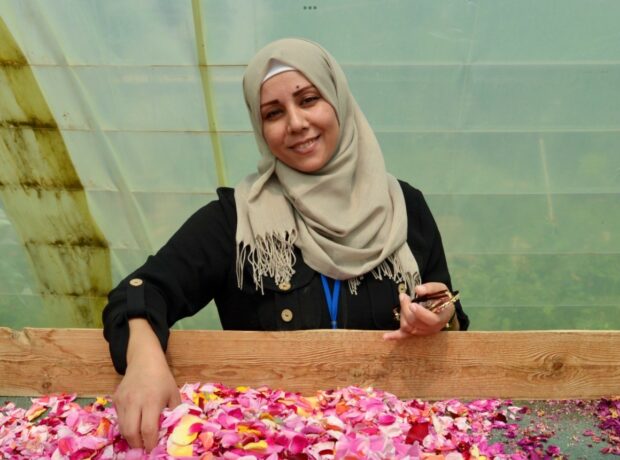This year’s Amnesty Media Awards have highlighted important stories and inventive reporting from around the world. We pick five reports from seasoned journalists and newcomers across radio, TV and print – plus a digital graphic novel – that set the standard for human rights journalism.
“I can’t believe this. He’s 10, yes?…I think he doesn’t quite know, himself, how to react to it. He’s half-smiling and half-horrified…”
Lost Children of ISIS – BBC World Service
Documentaries (radio and podcasts) – winner
In this dispatch from northern Iraq, veteran reporter Tim Whewell brings us the voices of children who were captured, threatened, abused and indoctrinated by ISIS (Daesh). In the 30-minute report Whewell meets members of the persecuted Yazidi community, visiting the holy temple complex at Lalish. He finds tens of thousands of people are searching for children after boy fighters and girl captives have been ripped from their families. The report includes the shocking testimony of a 10-year-old boy and the story of a mother who had to buy her son back from ISIS. Listen here.
Find out more about how the Yazidi community’s fight for justice in this report from Iraq by previous Amnesty Media Award-winner Billy Briggs and Angela Catlin.
“Big problem if I die here tonight, everybody is responsible.”
Undercover: Britain’s Immigration Secrets – BBC Panorama
Outstanding Impact Award – finalist
When he left school at 18, Callum Tulley took a job in an immigration removal centre near Gatwick Airport. Brook House, which opened eight years ago, was originally designed to house people for up to 72 hours before they were deported, but the length of time people are being held is increasing. The latest Home Office statistics show that in the year to June 2017 there were 200 people who left detention after being held for more than 12 months – with one person spending 1,514 days (more than four years) in detention. Callum was so appalled by the conditions he witnessed at Brook House, run by G4S, he turned whistleblower, going undercover for BBC’s Panorama. His report shows visa overstayers detained alongside former prisoners, and one detainee who claims to be 14 years old, in an establishment crippled by a drug epidemic. Recordings detail not only a callous attitude from an under-resourced workforce but incidents of assault and brutality. Watch here.
The winner in this category was the extensive Reuters investigation from the Philippines, Duterte’s War. Find out more about immigration removal centres in this report from Lacuna’s writer-in-residence Rebecca Omonira-Oyekanmi.
“The recent conflict has been an ‘orphan factory,’ causing an explosion in the number of kids living on the streets.”
House Without Windows – Huffington Post UK
Innovation Award – winner
Photojournalist Marc Ellison and illustrator Didier Kassai won the innovations prize for this graphic novel published by the Huffington Post. Travelling around the Central African Republic, the pair speak with the “Bangui Boys” who are living on the dangerous streets of the capital after fleeing physical abuse from their families, as well as accusations of witchcraft. The story examines the impact of conflict, the country’s diamond-mining industry and the lack of healthcare on the citizens of CAR, combining comic strip-style illustrations, photographs and video footage to bring the country and the people to life. Flick through here.
“I came in here and I broke down. I would describe it as like a bail hostel. The rules and regulations here don’t make you feel like a human being.”
Hidden Homeless – Hackney Gazette
Nations and Regions – winner
Since the 1980s private rents have soared in Hackney on the crest of a buoyant housing market. Over the same period, 10,000 council homes have been lost, leading to an acute shortage of affordable property. The Hackney Gazette’s Emma Youle reports on the spiralling number of families in crisis who are being placed in hostels and B&Bs, often for months or years at a time with no prospect of a permanent home. The newspaper’s Hidden Homeless campaign hears from a young mum forced to share a single bed with a newborn baby, uncovers the conditions of a local hostel, analysing its impact on the health and wellbeing of its residents, and conveys the figures behind the crisis through accessible stories and infographics. More here.
For more see this series on housing from Lacuna’s writer-in-residence Rebecca Omonira-Oyekanmi.
“If you’re going to the foot of the cross where the mercy’s supposed to be…If you’ve gone there and they can’t turn around and help you…then what are you supposed to do?”
The Boy Who Killed – The Guardian
Feature Award – winner
The Guardian’s editor-at-large Gary Younge won the feature prize for his story examining the stabbing of a teenage boy in north-west London. The story starts with a mother’s crystal clear cry for help. Despite warning that her son’s rapidly deteriorating behaviour would end in tragedy, her desperate pleas to her MP and social services fail to prevent the ensuing tragedy. It is a rare insight into the prelude of a stabbing and the resulting impact, not just on the victim and perpetrator, but on their loved ones. It also prompts the reader to ask how easily the 39 young lives lost to knife crime in the UK last year (and the countless others affected) could have been saved. This compelling feature was part of The Guardian’s Beyond The Blade series.
Find the full list of winners from last night’s Amnesty Media Awards here.
Main image by Amnesty International UK
- For the latest human rights and social justice stories, like our Facebook page and subscribe here.



